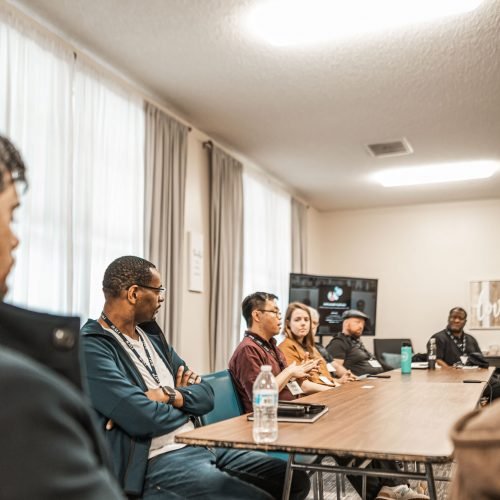
The Robert E. Webber Institute for Worship Studies offers two worship degree programs, the Master of Worship Studies (M.W.S.) and the Doctor of Worship Studies (D.W.S.), and two non-degree certificate programs. Courses are offered through a hybrid of on-campus intensives and distance learning.
IWS holds two semesters each year, with each semester involving an eight-day intensive session on campus in Jacksonville, Florida, each January and June. New students may begin their degree program in either semester, but note that the work for these intensives actually begins several weeks prior to the on-campus session. For students unable to attend two sessions per year, an Extended Track is available. Students complete pre-course and post-course requirements through distance education, using a combination of e-mail, discussion boards, and the virtual classroom. Professors are responsible for mentoring students as they complete each course.
Doctoral students will need to attend a total of five on-campus sessions (once for each of the four ‘content’ courses of DWS 701-704 and the accompanying practica, and once to take DWS 801 which begins the thesis phase of the degree program). Masters students will attend a total of four on-campus sessions, as a separate week of attendance for the MWS 601 Internship course is not necessary. The typical two-year course of study to complete the four ‘core’ courses (i.e., excluding the capstone thesis and internship courses) may be pursued over four years through the Extended Track option.
When students and faculty are not on campus, interaction takes place in an online learning environment. Instructors are available through online chats and message boards, e-mail, telephone, and video chat. Coursework and projects are submitted electronically at the end of the semester (guidelines and due dates are of course specific to each course’s syllabus).
Qualified students who hold a master’s degree may enroll in the D.W.S. Advanced Graduate Certificate Program as non-degree students. Upon successful completion of the four core courses they will receive the Advanced Graduate Certificate of Worship Studies (A.G.C.W.S.) without having to take the Thesis/Project course.
Qualified students who hold a bachelor’s degree may enroll in the M.W.S. Graduate Certificate Program as non-degree students. Upon successful completion of the core courses and the online courses they will receive the Graduate Certificate of Worship Studies (G.C.W.S.) without having to take the Internship course.
The purpose of the Doctor of Worship Studies (D.W.S.) and Master of Worship Studies (M.W.S.) programs, offered uniquely through The Institute for Worship Studies, is to further equip worship leaders,instructors, and others interested in the theory and practice of Christian worship, for their responsibilities in the local church and other settings. These programs grew out of the need of worship pastors and leaders, often trained and credentialed at the master’s degree level in church music, for additional study in the field of Christian worship. This constituency found that with its academic credentials in music it was difficult to be accepted into a graduate degree program other than one specifically related to music. The D.W.S. and M.W.S. programs are intended to fill this gap.
The Doctor of Worship Studies degree is a professional, terminal degree. Although it is a doctoral-level program, requiring a master’s degree for acceptance, it is not represented as a research degree on the level of the Ph.D.
Details of existing Cooperative Educational Agreements (Credit Transfer Agreements) with B. H. Carroll Theological Institute, Gordon-Conwell Theological Seminary, and Knox Seminary are available here. Although many other colleges and seminaries have also recognized the quality of the courses provided by IWS and have transferred IWS credits, accepting transfer credits is the responsibility and prerogative of institutions. The accredited status of an institution is an important, but not the sole factor, that is considered in the transfer of credit decisions. Institutions usually commit to at least consideration of transfer requests, not rejecting such requests out of hand.